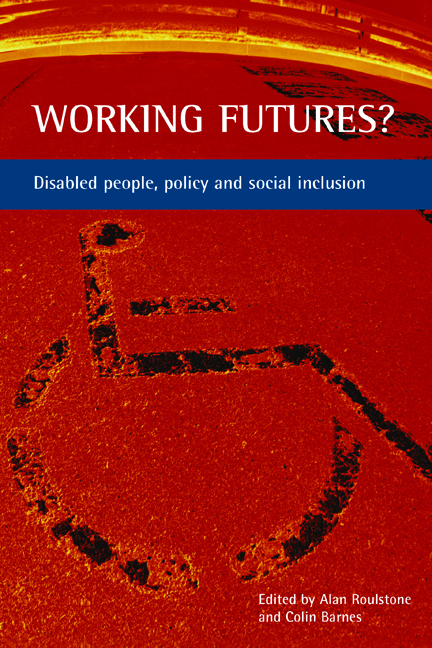Book contents
- Frontmatter
- Contents
- List of figures, tables and boxes
- Preface
- Acknowledgements
- List of abbreviations
- Notes on contributors
- Introduction Working futures: disabled people, employment policy and social inclusion
- Part One Work, welfare and social inclusion: challenges, concepts and questions
- Part Two The current policy environment
- Part Three Towards inclusive policy futures
- Index
- Also available from The Policy Press
seventeen - Work matters: visual impairment, disabling barriers and employment options
Published online by Cambridge University Press: 18 January 2022
- Frontmatter
- Contents
- List of figures, tables and boxes
- Preface
- Acknowledgements
- List of abbreviations
- Notes on contributors
- Introduction Working futures: disabled people, employment policy and social inclusion
- Part One Work, welfare and social inclusion: challenges, concepts and questions
- Part Two The current policy environment
- Part Three Towards inclusive policy futures
- Index
- Also available from The Policy Press
Summary
Introduction
As the 500th Jobcentre Plus office opens in Middlesbrough and the UK government talks about ‘full employment in every region’ (DWP, 2003), this chapter draws attention to the high proportion of blind and partially sighted people who are not in work. It highlights the issues facing blind and partially sighted job seekers, examines critically the interventions that have been designed to help them into work, and suggests solutions and recommendations to policy makers and employers alike about how best to redress the current situation.
The Royal National Institute of the Blind (RNIB) is the leading voluntary sector organisation supporting people with sight loss in the UK. It became the organisation ‘of ’ a few years ago with a growing membership of over 12,000 blind and partially sighted people. The membership votes for assembly and board members and these groups set strategy. Blind and partially sighted people are at the heart of the policy-making process. Work matters (RNIB, 2004) is an example of our employment campaigning work. The key element of this campaign was a network of blind and partially sighted spokespeople across the UK who demonstrated how they succeed in a range of jobs.
As a result of the RNIB Work Matters campaign and the Beyond the Stereotypes report (Simkiss and Baker, 2004) a number of parliamentary questions have been tabled on key disability employment programmes which impact people with visual impairments. For example, attention has been paid to the Access to Work budget, rehabilitation programmes for blind and partially sighted people, disability leave legislation and employment rights of blind and partially sighted people. The campaign culminated with Work Matters fringe events at the Trades Union Congress (TUC) and Labour Party Conferences at which Brendan Barber, Director General of the TUC, promoted the report, David Blunkett, the then Home Secretary, lent his support, and Digby Jones, Director of the CBI said, “We need regulation in this area”.
The RNIB's policy and campaigning is based upon consultation with blind and partially sighted people through the governance structure, membership, research and service delivery. In 2003/04, RNIB regional and national employment staff in England alone supported 842 blind and partially sighted people to gain or retain employment through direct placement activity and indirect activity such as Access to Work assessments and vocational guidance.
- Type
- Chapter
- Information
- Working Futures?Disabled People, Policy and Social Inclusion, pp. 245 - 258Publisher: Bristol University PressPrint publication year: 2005

